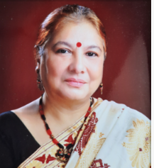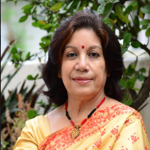Translated from the Assamese by Ranjita Biswas
Eva. Short, rather meaningless, a name given without much thought. The person who bears this name does not have anything to set her apart from the milieu. She is one among the nondescript women in the crowd you pass by, without giving a second glance. Neither fair nor dark; neither too tall nor too short to draw attention. Somehow, scraping through the exams with third division every time, she has managed to obtain a graduate degree. She is not very competent to do household chores, but she somehow manages to get them done.
Her marriage had also taken place without any flamboyance. She was the third daughter in the family. Her arrival did not bring much joy to her parents. She was, after all, a ‘minus’ point. However, the ‘plus’ point had arrived after a year of her birth. It was an easy calculation— if you pay more attention to the ‘plus’, then the ‘minus’ tends to get neglected. So, Eva did not get many of the things she wanted. A little bit of milk, a cream-filled biscuit, a whole boiled egg, a new pair of shoes— these were little indulgences she craved for. There was always a big gap between what she desired and what she got. It remained so even when she got married. Right from her childhood, she was used to hearing: “Let your brother have it; let him go to the hostel of that big college! Please have a health check-up for the boy at the city hospital; he needs special tuition classes- Do you hear?” And so on and so forth. After her puberty, she stopped begging for the little things. She stopped being angry about them. She accepted them.
In the same way, she accepted, without a whimper, when they arranged her marriage. Her father wanted to get done with it before he retired from service. Her in-laws’ house was in a village, not very far from their home. Her would-be-husband worked in Guwahati. He had a non-descript job; he had a nondescript countenance; he was an ordinary man. After the wedding ceremony that denuded her parents’ meager resources, she came to live in the city. Now, she was Eva Deka instead of Eva Barua.
This Eva, or Eva Deka, now approaches a beauty parlor. City Lady Beauty Parlor. It is one of the leading beauty parlors in the city. It is quite spacious compared to many others in the business. There is a lawn in the front. The proprietor of the City Lady is also a city-lady in the truest sense. Three generations of her family have lived in this city. Their big house is in the central part of the city. The beautiful structure has not lost its luster though it was built in her grandfather’s time. A location like this is ideal for building a multi-storeyed apartment and one would have to be wise to take advantage of it. But this aristocratic family is in no need of extra money. The foundation of their wealth is rock-solid, built over three generations.
The owner of the parlor, Priyadarshini Chaliha, is the daughter-in-law of this family. She was a star student of beautician Shahnaz Husain. Now, she is a reliable agent for Shahnaz’s Herbal products. She is a beauty columnist in many magazines; she appears on TV programs; in short, Priyadarshini Chaliha’s City Lady has a special status among the swanky classes. It doesn’t matter that the rates are double the amount charged by other parlors. At any time, you can see a long queue of cars in front of the City Lady. Some of these cars even flaunt armed guards.
Eva Deka is now standing in front of this parlor. Well, not exactly in front of it but at a little distance from the front, near the bus stop. The bus was very crowded. It was office-time, after all. But she could not afford to go out of the house in the afternoon. The children would be returning from school. Then, her husband would be home. Making tea, storing water from the tap, preparing dinner— there were a thousand chores to take care of.
As soon as she got off the bus, Eva arranged the folds of her saree. She inspected the falls to see if there were any speckles of dirt or stain. On the bus, a man was stamping on the ends of her saree. It was too crowded for her to move and so, she did not have any choice but to watch those thick pair of soles trampling on her precious saree. And to think how long she had to wait to buy this soft pure silk saree in peacock blue! It was her only expensive saree. She ran her palm over her hair. Then, she opened her bag to see if the small purse was inside. Yes, everything was in place; the notes tied with a rubber band were there. With all these pickpockets moving around, one never knows!
Eva enters the compound. At the entrance, a white car waits. The driver is in a uniform, his name displayed on the lapel of his coat. He starts the car, slowly advancing, so that she could enter the driveway. The indicator light blinks to convey that it is going to turn to the right.
The driver approaches Eva. He gives her a salaam. A smile hovers on her lips. It is the smile of a boss. A smile that does not indulge one’s employees but at the same time, it gives a hint of kindness to reassure them.
“Memsa’b, what time should I bring the car?”
“What did your saheb say? Doesn’t he have his office car today?”
“Yes, it’s there. But today, it’s Saturday. I’ll have to fetch the children from school.”
Eva looks at her wristwatch. She seems to ponder a little.
It’s already past 11 o’clock. Kuki’s school will be over by twelve. She’ll have to go to her music class straightaway after school. Ron will have to go to his karate class.
“I’ll hardly take half an hour here. If I stop by, will it be too late for them?”
The driver waits. Eva’s face shows that she is angry.
“I’ll have to sell this Maruti. The driver is just sitting around doing nothing. It’s becoming a nuisance.”
“I have a customer if you want to sell,” the driver says, smiling slightly.
“Your saheb bought it when he first joined the office. He’s sentimental about selling it.”
“It was sent for repair yesterday,” the driver tries to help with his boss’s dilemma.
“It’s a bother when Kuki and Ron have to sit in the car.”
Eva checks her phone. The car is in the garage next to the office. The car will have to be sent to the school. Eva expresses her annoyance to her husband over the phone, “We can’t use this Maruti for Ron and Kuki. We already have the Ikon. Otherwise, I’d have taken one. It’s so uncomfortable! I think you should buy a Lancer. I feel quite ashamed to have the Maruti parked in front of the house. Even teacher Jibon in our backyard has bought an 800 with a bank loan.”
Eva smiles as she listens to her husband. This man, whose personality evokes instant respect; this handsome, intelligent man has never said no to her; he has always indulged her beyond expectations. She feels like saying, “I love you,” over the phone.
The man, Harshabardhan Hazarika, IAS, deputy secretary to the ministry of education, is wearing a black suit with a maroon tie. A golden chrysanthemum radiates from the button-hole of the coat that she had pinned in the morning.
No, he is not wearing a suit today. He is sporting a pair of blue jeans and a white full-sleeve shirt. The top buttons are open, giving a glimpse of thick black tufts of hair on his fair chest; his feet are wrapped in a pair of sandal shoes, showing off his healthy crimson heels. Eva can smell his expensive body spray. No, it’s not the body spray she smells but the perfume of some unknown wildflower, floating around this well-built handsome man. The smell is slowly entering her senses. A soft warm glow is spreading over her veins. Her lips are opening in a warm smile.
Eva pushed through the glass doors of City Lady. A girl who was threading the eyebrows of a woman called out, “Please come,” without stopping her task. Eva’s smile was a bit nervous. Uneasy. It was in contrast to the warm smile a few minutes ago.
Eva could easily travel between that dreamy smile and this nervous smile of cold reality. Just like she traveled from that pale, short, partially bald, Nagen Deka – the eldest of the six siblings and the only job-holder in the family– to the well-appointed, H. B. Hazarika, with a chrysanthemum peeping from the button-hole of his coat; from the city bus to a Ford Ikon. Like she did when she was young, munching on a dry toast biscuit and imagining it to be a cream-filled one; from a rag doll to a doll with golden hair; from a lump of jaggery to a piece of chocolate. She could move like this, secretly, in her self-created world, without anyone ever guessing about its existence.
__
Also read:



























0 Comments